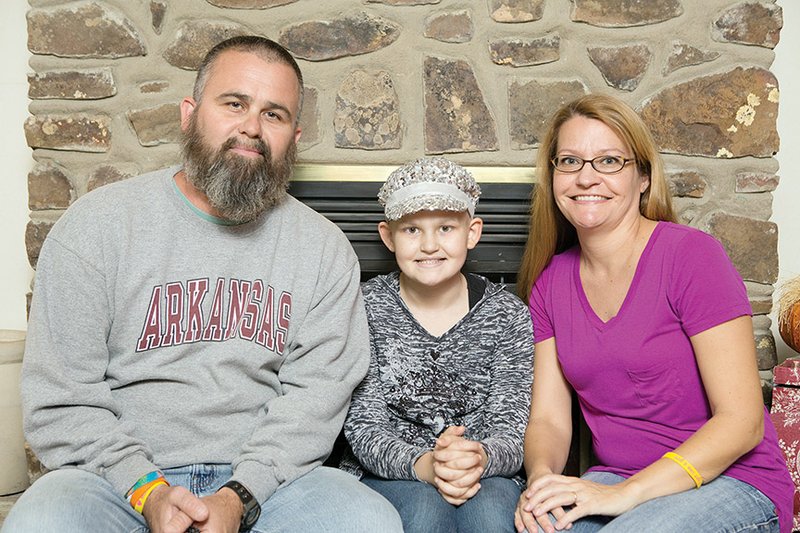Maddie Grace Windle may not be old enough to give blood, but she knows it is an important act that can save lives.
“Not everyone has a lot of time or a lot of money, but everyone has blood,” she said. “Donating blood can save a life. It saved my life.”
Maddie is an 11-year-old central-Arkansas girl who enjoys piano lessons, drawing and swimming. For the past three years, however, Maddie has been fighting for her life.
In 2011, Maddie was diagnosed with a Wilms’ tumor, a type of kidney cancer that occurs in children. Since she was first diagnosed with the disease, Maddie has fought three recurrences. She has gone through stem-cell transplants and chemotherapy for months at a time, with the goal of remission.
Throughout her treatment, Maddie has received blood and platelet transfusions. At one point, this included five units of red blood cells and three units of platelets each week.
“You just feel so tired and awful when you need a transfusion,” she said. “Then when you get a blood or platelet transfusion, you just feel so much better. It’s like you are back to normal again.”
Maddie’s disease was in remission as of June 2014, but on July 16, doctors discovered cancer had again invaded Maddie’s body, this time with a tumor around her aorta. She underwent surgery July 24, and the doctors were able to remove about 85 percent of the tumor. Now, she faces more chemotherapy and radiation as her treatment continues.
Before the surgery took place, Maddie’s platelet levels had to be at a certain level. Platelets are key clotting components of the blood and are often needed by cancer patients, burn victims and bone-marrow recipients.
According to the Johns Hopkins Medicine website, a healthy person’s blood normally contains 150,000 to 400,000 platelets per microliter of blood. A person with 150,000 platelets per microliter is considered to have a platelet count of 150.
The platelet count is measured through a blood test called a complete blood count. Maddie’s platelet count was around 60 the day before her surgery. She needed a unit of platelets before she could go into surgery.
“We are just so thankful for all of the blood donors that have helped Maddie,” said her mother, Gina Windle. “It’s amazing.”
Unfortunately, summer is a bad time for the American Red Cross. Blood donations go down because donors are busy. Kids are home for summer break, and out-of-town vacations take up summer schedules, all of which push donating blood down on people’s to-do lists. According to the American Red Cross, donations through the Red Cross have been down about 8 percent over the past 11 weeks. This totals 80,000 fewer donations than was expected, and the numbers continue to decline.
Scott Caswell, American Red Cross CEO for the Greater Ozarks-Arkansas Region, said the blood situation in the region is nearing alarmingly low levels.
“The American Red Cross is facing a looming blood shortage,” he said. “We’re experiencing a shortfall in donations significant enough that the Red Cross could experience an emergency situation in the coming weeks. We are asking donors of all blood types to give now.”
All blood types are needed, but the American Red Cross said donors with blood types O negative, B negative and A negative are especially encouraged to donate. Type O negative is the universal blood type and can be transfused to any recipient.
Platelets, like the ones Maddie needed before her surgery, must be transfused within five days of donation, making it imperative for medical centers to have access to a steady supply.
Maddie is just one of the many patients who need blood and platelets for their medical care.
“Patients just like Maddie need your blood donations each and every day,” Caswell said. “Each day donations come up short, less blood is available for patients in need. That’s why we are asking for the public’s help now. We want to prevent an emergency shortage.”
Staff writer Angela Spencer can be reached at (501) 244-4307 or aspencer@arkansasonline.com.
